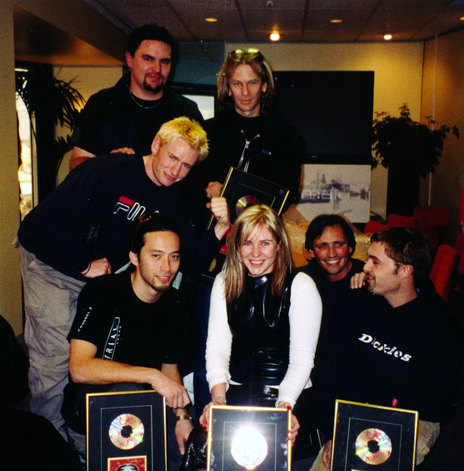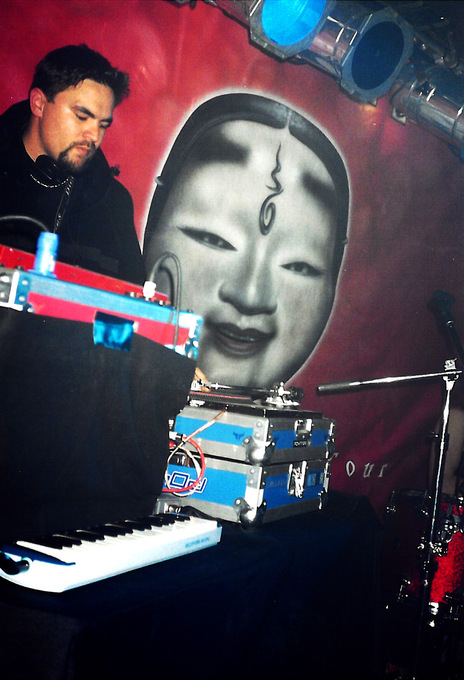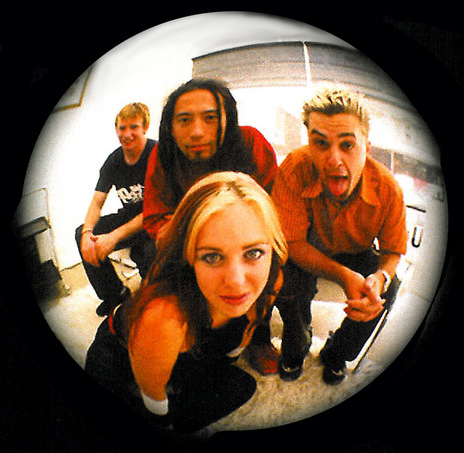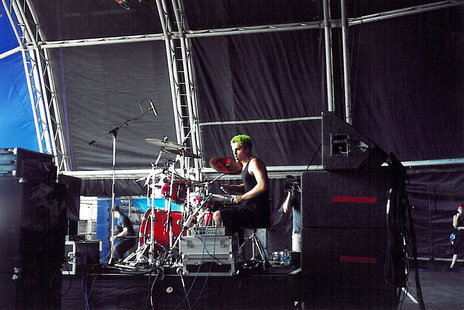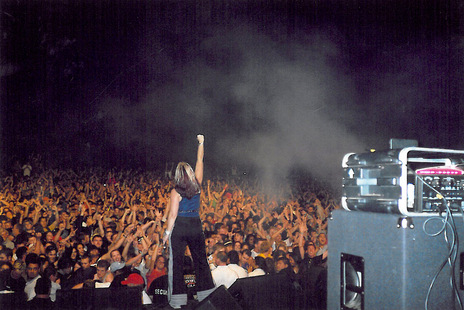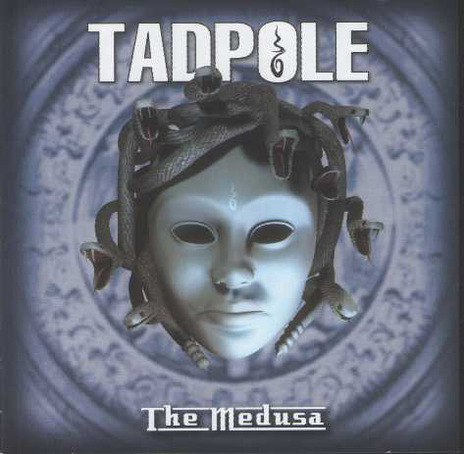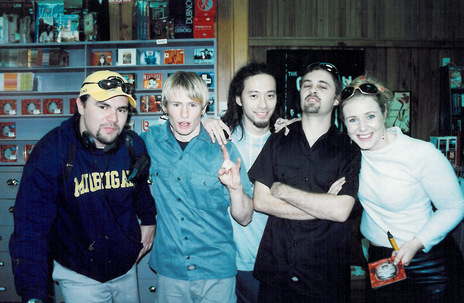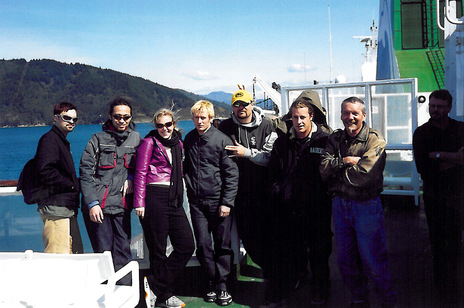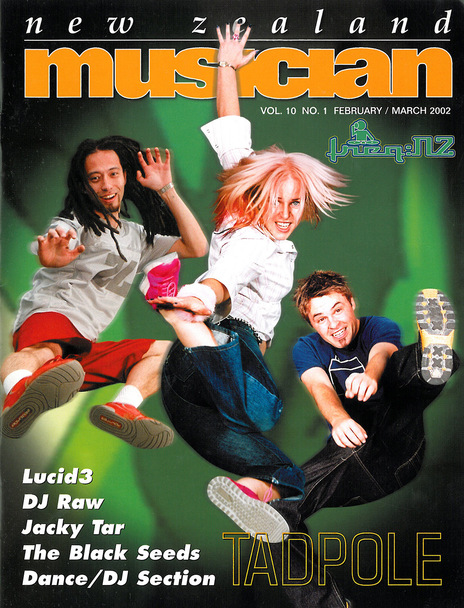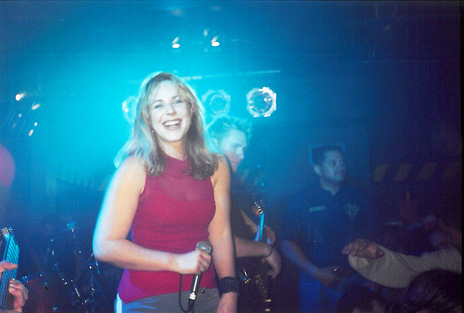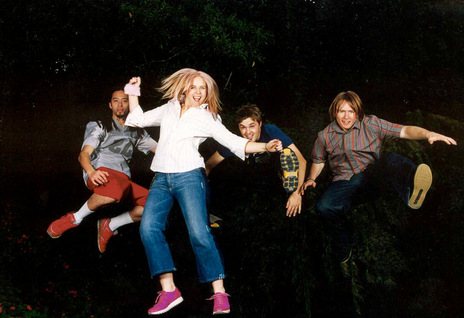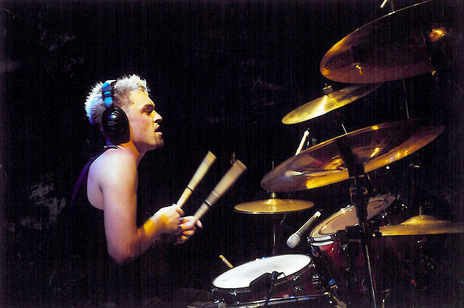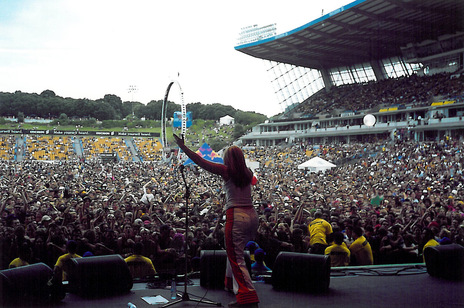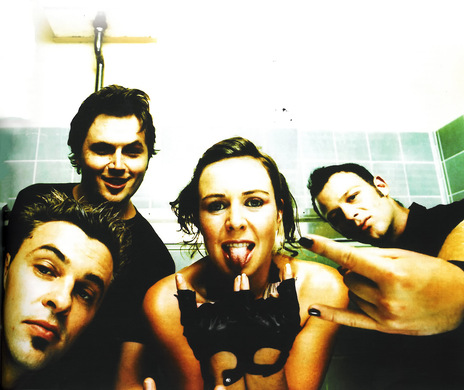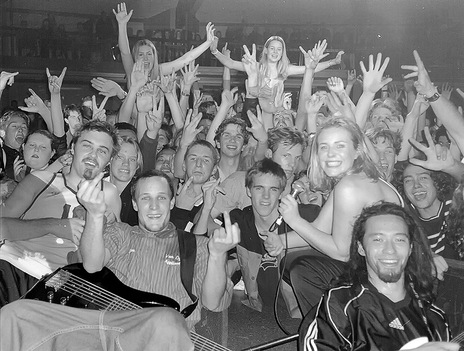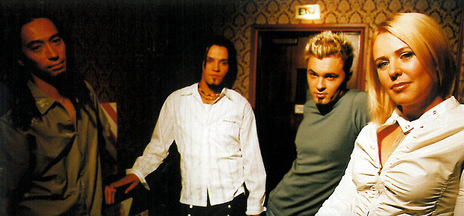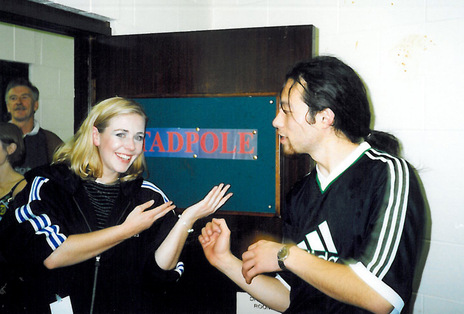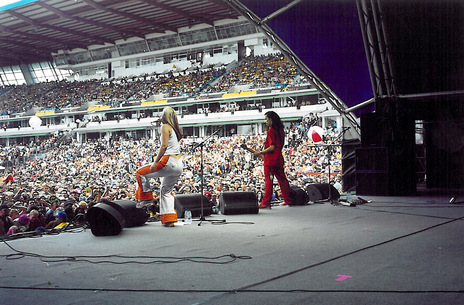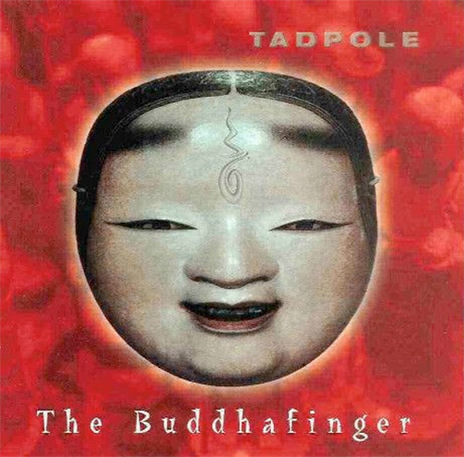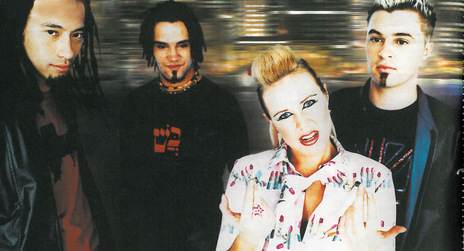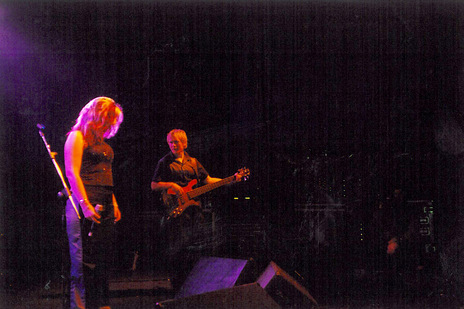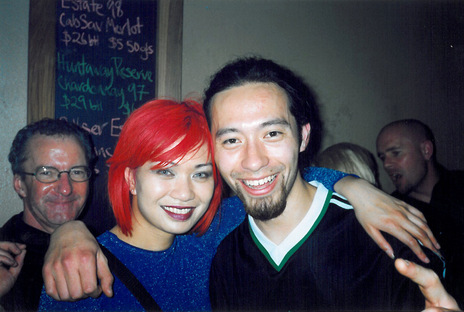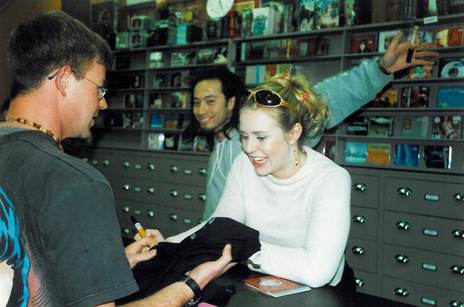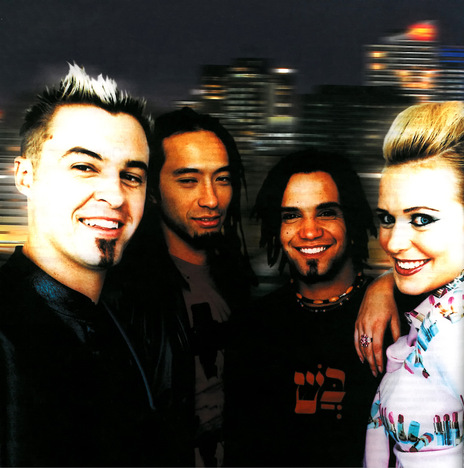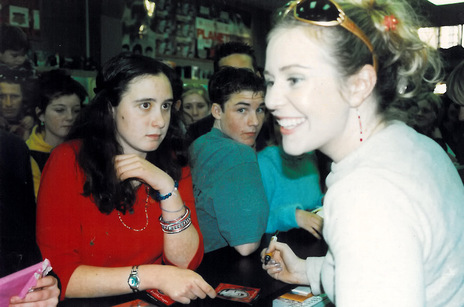Many expected the band to end after lead singer Cath Deeney quit the group. Instead the band posted an ad up at University of Auckland (where many of the members were enrolled) and the only respondent was singer Renee Brennan. She brought a more pop-influenced singing style and a tomboyish charisma – she preferred jeans to dresses and had an energetic stage persona, which was contrasted strikingly with her perfect blonde hair and unnervingly light blue eyes.
The next crucial addition to band was drummer Dean Lawton who remembers being recruited via an unlikely route. “Mareea’s dad Kim is a wicked jazz drummer and he used to teach me at Seddon High [now Western Springs College]. He called me and said that her band needed a drummer because they were in a semi-final for a battle of the bands. Their previous drummer, Greg Baker, had headed off overseas without even telling them! I was in a tribute reggae band at that time, doing Bob Marley covers, but Mareea’s dad convinced me to fill in. I’d previously booked gigs up and down the country for my reggae band so I thought, I’ll just help these guys out for a bit on drums and book them some gigs.”
The group’s sound changed markedly over this period and gradually the original members lost interest – Paterson, Huckle and second guitarist Andre Smith all left in quick succession and were eventually replaced by Kevin Webb (bass) and Louis Mason (guitar). Lawton became the band’s de facto manager and arranged for their first proper studio recording through an odd turn of events.
The band saw ‘Blind’ as a potential hit, but Lawton struggled to get it on radio.
“There was a guy who got a whole bunch of bands together to record a double-CD at York Street A and B studios, which he planned to promote through a run of gigs afterward. But he went bust and the studio didn't want to release the recordings to him without getting paid. Eventually they just put it out themselves and it became the Keen As (1998) compilation. Our song, ‘Blind’, ended up getting an NZ On Air grant so we re-recorded the song with Malcolm Welsford so it could be used to promote the compilation. The video was shot in the overflow tunnel of the Hunua Dam by Joe Lonie from Supergroove. There was actually a storm passing overhead, so water was running down the walls around us. Getting our gear in and out of there was pretty freaky!”
The band saw ‘Blind’ as a potential hit, but Lawton struggled to get it on radio. “We sort of outgrew bFM – we got a bit too commercial for them, which is just something that happens – and we couldn’t get traction at Hauraki either. So I cruised up to see Ross Godwin at Channel Z and before I’d played him half the track and he said yep I'll crank it, and put it straight on air. Then the radio station blew up and we tagged along with them.”
Channel Z had started in Wellington, but expanded to Auckland in 1997 and Christchurch in 1999, gradually creating a middle ground between student radio and commercial stations. It was followed soon after by the expansion of The Rock out of Hamilton, which provided another avenue for Tadpole’s music. Lawton also managed to arrange some useful sponsorship.
“We were sponsored by Mag and Turbo and Surf, Dive, and Sea which meant we played a lot of their store openings. Mag and Turbo eventually gave us a free truck and a free van to tour around the country in, that’s why we were able to spend so much time on the road. We were playing 150 to 200 shows a year, because that made it possible to keep the costs down. I went to school with the guys from Supergroove and took my whole approach to booking from them – they toured their balls off, so that’s what we did too.”
Lawton recalls that it was after one of these tours that the band was robbed. “We were touring the single and played Gisborne then back on Sunday so we could go to work the next day. We got home at two in the morning and figured that it’d only be a few hours until we got up, so we left the gear in the van. But when we left to go to work, it was gone! We did get the van back, but we lost a sampler and a drum kit. Though I did eventually get the kit back 10 years later. The guy who had it went into Rockshop to get a missing tom and someone I knew worked there and he rang me because he recognised the design – there was only one kit like it. I went over to the guy’s place with a mate and said, ‘I'll have that, it's mine, it was stolen.’ The poor guy had bought it off someone else and no idea.”
Multiple guitar parts were meshed into a wall of sound, while the drums had an almost industrial edge to them.
The changes in the group continued with Mason deciding the touring lifestyle wouldn’t fit with his plan to study medicine, so he was replaced by Chris Yong. When it came time to record a debut album, Lawton decided to sign with indie label Antenna Recordings. “We liked the owner, Trevor Reekie. He’d already put a lot of effort into the band in the months before we signed with him, helping us out with songwriting and other advice. We’d been to all the majors and my opinion was that we’d just get lost amongst all the other stuff they had going on. Fur Patrol and The Feelers were with Warner and Stellar were with Sony. EMI seemed the most keen, but by the time we spoke to them we’d already signed with Antenna. Our album ended up being distributed by EMI anyway, so we ended up getting their support – Morgan Donoghue and Chris Caddick were right into that band back then.”
When Webb quit the band, Lawton and Yong turned their attention to their songwriting and spent many long days in the practice room working out new tracks for Brennan to sing over. It was only once they were halfway through the recording their debut album that Lawton found a suitable replacement.
“Paul Matthews from Stylus joined us just after ‘Backdoor’ was released. He saw that we were doing what he really wanted to do and his band weren’t progressing as quickly at the time. He played on the rest of the album ...
“We’d already done all the drums at Revolver Studios. I suggested we set up a big PA in the studio which we'd mic to get a real live drum sound. Malcolm [Welsford] said ‘Oh, that sounds like fun!’ Everything else was recorded down out at Neil Finn’s studio in Karekare. Me and Malcolm hung out there for two-and-a-half months and we even had a chef staying with us, so she’d cook. It was pretty wicked.”
Welsford pushed the group’s sound until their songs filled up every space in the bandwidth. Multiple guitar parts were meshed into a wall of sound, while the drums had an almost industrial edge to them – though the sweetness of Brennan’s vocals were always lifted enough above the mix to ensure the main melody line was given full voice.
The group’s sound was also influenced by the inclusion of DJ Kritikl (Kevin May) who had been providing turntable scratching and samples for their live show. This put them alongside a new range of rock/hip hop crossover groups from the US such as Limp Bizkit and, later, Linkin Park and Korn (which were usually tagged as “nu-metal”), though Lawton said that they never made a conscious choice to join that scene of music.
“Some people thought we’d copied those bands but we didn’t even listen to them before we started doing it. It was coincidence really. We got into doing big dance beats when we were playing live. I noticed that when I played along with one of Kevin’s beats, the crowd would jump along a lot more, so that aspect got added into the album near the end.”
Their next singles, ‘For Me’ and ‘Backdoor’, rose just shy of the Top 10; the subsequent album The Buddhafinger (2000) entered the charts at No.2.
Their next singles, ‘For Me’ and ‘Backdoor’, rose just shy of the Top 10, laying the groundwork for the subsequent album The Buddhafinger (2000), to enter the charts at No.2, though Lawton recalls they almost got the top spot. "We only got bumped off number one by a couple of hundred units because of Robbie Williams!"
Yong found it hard at the time to appreciate the level of success they had achieved. “Tadpole was the first time I'd been in a band that was a bit more driven, so I had nothing to compare it to. And it always felt there was another hurdle to overcome or step left to take. However in saying that, it was definitely a highlight to reach so high on the album chart, then having massive turnouts to our shows on the following tour and performing main stage at Big Day Out 2001 was totally unreal.”
Support from NZ On Air helped keep the album on the charts. The band eventually received funding for seven music videos off the album and, along with relentless touring, this kept The Buddhafinger in the Top 40 for a remarkable 46 weeks, pushing sales far past double-platinum. They had less luck in Australia, where they toured in support of Killing Heidi, but Tadpole had become one of the biggest names in New Zealand rock. The band’s hectic progress was stemmed slightly by having Kritikl and Paul Matthews quit in short succession, though both hung around long enough to record some initial parts for their next album The Medusa (2002).
Malcolm Welsford was again brought in to produce the album and Lawton found that Matthews also played a big part. “Paul wrote quite a bit of the music for The Medusa. It was unfortunate that the album came out at the same time as Blindspott, they were the new thing and got a lot of attention. ‘Nothing New’ was our biggest played radio hit ever, it got across to ZM, The Edge, Classic Hits. Everyone played that song. We still sold 6,000 units. But I do think we changed too much on that second record, tried to be too clever. We played with a lot of electronic sounds and had a lot of fun in the studio. That meant we forgot about our core fan base that wanted to hear heavy rock.”
The Medusa (2002) was a Top 10 hit and the band went back to relentless touring, with Shannon Brown joining on bass. Lawton found that their growing success was matched by their successive slots at the Big Day Out. “We played a small stage [in 2000] and that was ginormous. The next year we went onto the main stage straight after Coldplay. Fred Durst was down in front of the mosh pit, filming us. That led us to being in talks with the label he was on, Interscope, but they ended up signing Zed instead!”
Tadpole again played the BDO main stage in 2002 and, remarkably, even returned for a fourth appearance the following year (though on a smaller stage). The band also played for the New Zealand troops stationed in East Timor and recorded the video for ‘Just Not Rock’n’Roll’ while they were there. The band were just hitting their stride once more, when they were hit by another succession of departures. Chris Yong quit the group, eventually forming his own bands, Redline and Static Era, and Shannon Brown left to join 48May.
Lawton pulled the band back together by recruiting their sound engineer, Ollie Gordon, to be their bass player and taking on guitarist Henry Penny. “We were sick of playing electronic stuff and Ollie and Henry were into the idea of making a real rock album too. We flew over a German producer, who we met when we went over to play a few gigs over there. He was awesome.”
The band announced it was breaking up before their final album, Tadpole (2006), was even released (through their own label, Benthouse Records). It was supported by the release of just one music video (‘Too Hard’) and a final performance in Auckland, though Lawton found that self-releasing the album meant they recouped more from sales than on their previous releases, since there were no labels drawing expenses or taking a cut from profits.
Lawton explains that the breakup of his relationship with Brennan didn’t play into the band's decision to quit. “We'd broken up two years beforehand and we were fine with working together. But the two of us had worked so hard to keep it together over the last 12 years and, at the end of the day, we’d just had enough. It’s tough when you’ve put so much time and effort into it, but you really haven’t made a lot of money. But me and Renee were over it. She was probably sick of sitting for five or six hours in van with guys talking shit for tour after tour! She wanted to go overseas so she went to teach English in Spain, and then moved to London. Henry moved to London as well. I started out by getting into property development, but I eventually slipped back into the music game! I run the Music Agency now. I manage original acts like Sons Of Zion, Josh Leys, and Soljah, as well as covers groups like The Dozen, which is the band I play in now.”
Tadpole's enduring achievement was being amongst a raft of bands that broke down the barriers to commercial radio play.
Ollie Gordon continued in music – he joined Autozamm and then went on successive overseas tours as a guitar tech/roadie for The Naked and Famous. The band’s most well known bass player, Paul Matthews, had the strongest second act – his band Stylus soon broke up, but he moved to England where he met up with Shelton Woolright from Blindspott and the pair started the chart-topping heavy rock act I Am Giant.
Tadpole's enduring achievement was being amongst a raft of bands that broke down the barriers to commercial radio play at the turn of the new decade, along with The Feelers, Fur Patrol, Bic Runga and Stellar*. They also helped to kick start the summer touring circuit that continues to provide a boost to the local music industry during December and January each year.
Lawton remains proud of his involvement in this crucial period for local music. “It was a cool time. I don’t think there'll be another period in New Zealand music where you’ll get that kind of commercial growth. The industry has stayed solid since then and that’s great. Commercial radio still don’t always do what they’re supposed to do and I get frustrated trying to push Sons Of Zion, but it's a lot better than it used to be. In the Tadpole days, we’d play any small town that would take us – Levin, Hawera, anywhere. Now bands don’t have to do that, because they can be discovered over the internet. If you’ve got 20,000 fans on Facebook then you can reach your whole core audience in one status update! When we got going, the industry was just working out what New Zealand music could be. Now I go along to the music awards and look around the room and see Lorde, Broods, P-Money and a bunch more acts who are all doing well commercially. It’s awesome to see how much the industry has changed.”
--
The legacy of Tadpole faded over the decade-and-a-half following their break-up, partly due to the fact that the band believed they had signed away their rights to their first two albums. This gave them little impetus to do anything to promote them. In 2022, Dino Lawton was sorting through an old box of papers and discovered that there’d actually been a second contract written up around the time of Medusa (2002) which superseded the one he’d always thought the band were bound by. He was thrilled to discover that this contract reverted rights to the band after 10 years.
He and Chris Yong undertook negotiations through a lawyer to reinstate their control of the original recording so that they could arrange a 4-CD reissue of their albums, which included a rarities disc of unreleased demos. They followed this in 2023 and 2024 with vinyl pressings of Buddhafinger (2000) and Medusa (2002).
Renee Brennan wasn’t involved in the negotiations and was reluctant to get involved. She had returned to New Zealand, but her only musical outings had been singing with a swing band, including sessions at the Auckland Jazz and Blues club. However, after meeting up with Chris Yong and reminiscing about all the fun they’d had as a band, she gave her blessing to the reissues. She also helped promote the album, including an interview with Newstalk ZB in which she discussed how difficult it had been continuing in the band after her break-up with Lawton and how this had soured her memories of the band. Yet, she admitted in the interview that her discussions with Yong had made her realise that they had achieved a remarkable amount and when she listened back to their albums she was filled with pride.
Lawton and Yong reformed the band with Shannon Brown on bass and DJ Kritikl on turntables. Brennan wasn’t interested in taking part, but was happy to step aside for Christchurch hard rock singer Emma Dilemma to take her place. The band hit the road in mid-2024 with Devilskin for a 12-date tour of the country. Then later in the year, the band did another run of shows – Tauranga Smoke and Ōtautahi Smoke – with a new singer, Lauren Marshall (better known for the funky pop she makes as LOVETA). In 2025 they announced a tour supporting I Am Giant, which includes their former bass player Paul Matthews alongside Shelton Woolright from Blindspott.
The fans of their music still remained, leading to millions of streams and an excited reception to their reunion shows. The first time around, the band had fizzled out, with Brennan quitting just after the release of their third album, so it was nice for the group to have a second chance at writing a final chapter that was more befitting of their remarkable achievements.
– Update by Gareth Shute, 2025
